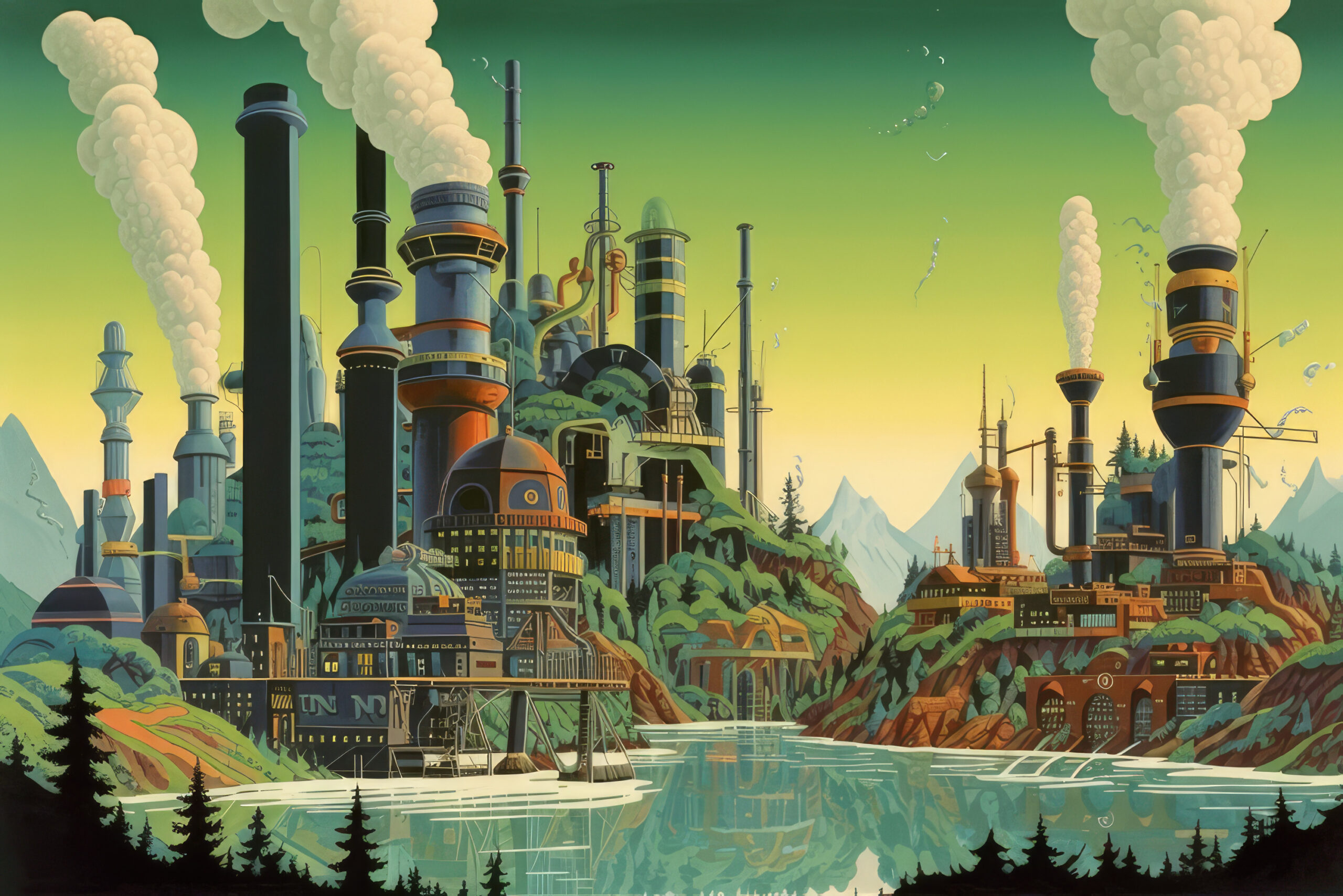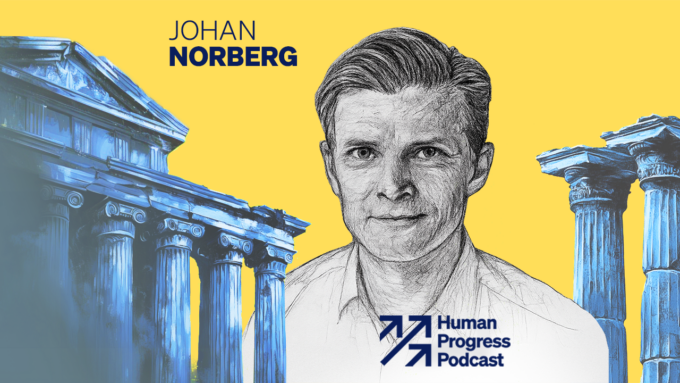Summary: This article takes on the critics of human progress who claim that acknowledging the world’s improvement leads to complacency and resistance to change. Past progress was the outcome of bold and innovative changes, and future progress similarly depends on our ability to solve the problems we face with curiosity and acceptance of radical change. There is no fundamental limit to human progress, so we can always create a better world for ourselves and others.
Despite often being obscured by doom and gloom in the media, and risks of potential future hardships, the most important trends in human well-being still tell a story of progress.
After falling back slightly in 2020–2022 due in part to the COVID-19 pandemic, global life expectancy has reached an all-time high of about 73 years as of 2023—that’s more than double what it was in 1900. Global literacy, at 87 percent as of 2021, has been rising steadily from 12 percent in 1820. Even climate-related deaths, despite anthropogenic climate change, are still falling steadily due to increased climate resilience—down from almost 500,000 per year in the 1920s to well under 50,000 per year in the last decade.
But what motivation for future action should humanity draw from these and other similar facts? In a recent New York Times opinion piece, London School of Economics economist Jerome Roos criticizes the “progress narrative” as an excuse for inaction:
If doomsday thinkers worry endlessly that things are about to get a lot worse, the prophets of progress maintain that things have only been getting better—and are likely to continue to do so in the future. . . . Exemplified by a slew of best-selling books and viral TED talks, this view tends to downplay the challenges we face and instead insists on the inexorable march of human progress. . . . The Panglossian scenario painted by these new optimists naturally appeals to defenders of the status quo. If things are really getting better, there is clearly no need for transformative change to confront the most pressing problems of our time.
It is generally only the critics of human progress—not its proponents—who draw this profoundly flawed conclusion. Past progress has often been the result of transformative change, from political changes like the abolition of slavery and empowerment of women to technological and scientific changes like the green revolution and the invention of the internet. And it is likely that future progress will also take the form of transformative change to address the most pressing problems of the future.
The story of humanity’s exponential advance since the Industrial Revolution would only represent a call to inaction if progress were fundamentally limited to something approximating what has already been achieved. But that premise is precisely what the “progress narrative” corrects.
No fundamental limit to progress is yet in evidence. In his book The Beginning of Infinity: Explanations That Transform the World, University of Oxford physicist David Deutsch shows the enormity of the burden of proof on anyone positing a fundamental limit to, for example, material progress:
Consider the set of all conceivable transformations of physical objects. Some of those (like faster-than-light communication) never happen because they are forbidden by laws of nature; some (like the formation of stars out of primordial hydrogen) happen spontaneously; and some (such as converting air and water into trees, or converting raw materials into a radio telescope) are possible, but happen only when the requisite knowledge is present—for instance, imbodied in genes or brains. But those are the only possibilities. That is to say, every putative physical transformation, to be performed in a given time with given resources or under any other conditions, is either
— impossible because it is forbidden by the laws of nature; or
— achievable, given the right knowledge.That momentous dichotomy exists because if there were transformations that technology could never achieve regardless of what knowledge was brought to bear, then this fact would itself be a testable regularity in nature.
Any such regularity, if both demonstrated to exist and shown to broadly prohibit the continued accrual of human knowledge and material advancement for millennia to come, would represent a scientific paradigm shift worthy of a Nobel Prize and then some.
As an example of the implications of his abovementioned dichotomy, Deutsch explains that:
Whether humans could live entirely outside the biosphere—say, on the moon—does not depend on the quirks of human biochemistry. Just as humans currently cause over a tonne of vitamin C to appear in Oxfordshire every week (from their farms and factories), so they could do the same on the moon—and the same goes for breathable air, water, a comfortable temperature and all their other parochial needs. Those needs can all be met, given the right knowledge, by transforming other resources.
Global poverty has been enormously reduced by transformative change throughout the last century, and there is no reason why human enrichment should not continue. Extreme poverty defined as $1.90 per person per day fell steadily from over 75 percent of the population in 1820 (and all of human history before that) to about 60 percent in 1920 to under 10 percent in 2020. Meanwhile, inflation-adjusted gross world product per capita increased from around $1,000 per year to around $15,000 per year over that period. That said, about half the humans on Earth still live on less than $7 per day. So, the urgency of accelerating economic growth and increasing wealth availability is (for practical and moral purposes) as pressing as ever.
And after that, everyone can become countless times wealthier still. What would life be like after another few thousand years of continued technological, scientific, and economic improvements? We can only begin to speculate.
To get a hint of how different the future might look, imagine trying to explain modern prosperity to humans living 12,000 years ago. Those people subsisted from caves or shanty huts and typically died agonizing deaths of disease, violence, or hunger after living only around 30 years on average. What would they think of running water, electric lighting, anesthesia, vaccines, digital photography, air and space travel, 3D printing, ChatGPT, global life expectancies of over 73 years, and so on?
Now think how much greater and faster the next 12,000 years of progress can be, especially given the relatively recent introductions of science, the internet, artificial intelligence, and other innovations capable of exponentially accelerating technological progress.
Perhaps human innovators or artificial intelligence will master the creation and terraforming of idyllic new worlds throughout space, facilitating yet-unimagined horizons of flourishing for life of all sorts. Perhaps biotech will expand the capacity of conscious beings to survive and thrive beyond what the human mind has yet begun to fathom. Or perhaps even these fanciful conjectures will pale in comparison to what the future really holds, as the predictions of past thinkers so often have.
What is the point of bringing up such outlandish-sounding sci-fi scenarios? To show how terribly unambitious it is to suggest, as Roos does, that the progress narrative indicates “no need for transformative change.” On the contrary, it is his apparent ignorance of humanity’s track record of progress that downplays the utility of transformative change.
While misunderstanding the progress narrative’s main advocates on the topic of “transformative change,” Roos also falsely claims that they view progress as “inexorable” and “Panglossian.” These straw men are almost identical to those marshaled by Alain de Botton in his and Malcolm Gladwell’s debate against Matt Ridley and Steven Pinker (two of the most prominent figures advancing the “progress narrative”). In response, Ridley summarizes what he and Pinker make abundantly clear throughout their respective books The Rational Optimist: How Prosperity Evolves and Enlightenment Now: The Case for Reason, Science, Humanism, and Progress:
Don’t go away with the idea that optimists like Steve and I think the world is perfect. I have no idea where Alain got that idea. Of course we don’t think that! We think quite the reverse! We think this world is a vale of tears, a slough of despond, compared to what it could be, and will be in the future if we do the right things.
The history of progress demonstrates that there is plenty of scope for transformative change. We should not settle for any “status quo” before aging is cured, depression is solved, political oppression is abolished, wealth is universal, space is colonized, quantum mechanics are understood, and every other good thing compatible with the laws of physics is achieved. And if there is no upper limit to how much better things can get, as I suspect there may not be, then stagnation will never be justified. That is the implication of the human progress trends, which are hopefully only just beginning.





